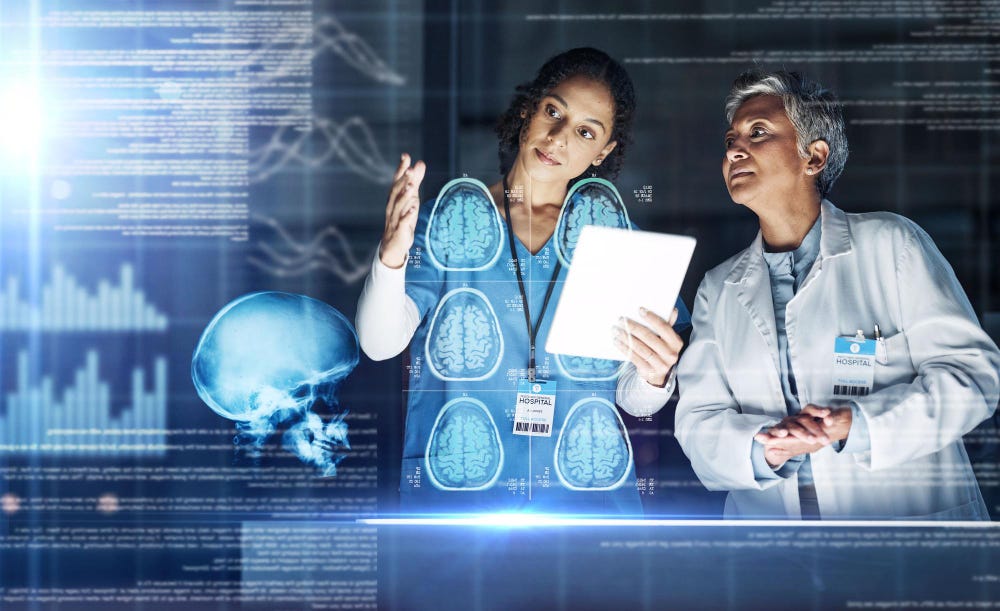The use of artificial intelligence (AI) in healthcare has been a major part of changing the way doctors work and patients are cared for. As 2024 draws to a close, AI technology has made significant strides to help diagnose, treat, and focus on patients faster and more accurately. This article describes the many ways artificial intelligence is transforming healthcare. It shows how it not only makes things run more smoothly, but also enables personalized and predictive medicine.
Consider the transformation of healthcare
Healthcare is one of the first fields to use artificial intelligence to improve patient care and medical research in multiple ways. Artificial intelligence is playing an increasingly important role in modern healthcare. Technologies such as machine learning, natural language processing and computer vision lead to new ideas. These improvements not only make diagnosis more accurate, but also make healthcare more accessible and effective.
Artificial intelligence is changing the accuracy of diagnosis and treatment planning.
Artificial intelligence algorithms make it easier to view large amounts of medical data, allowing for faster and more accurate diagnoses. In areas such as radiology and pathology, AI tools can spot image problems that the human eye might miss. This makes early diagnosis and treatment easier.
Application of artificial intelligence in personalized medicine
Another area where AI is really making a difference is personalized medicine, where medicines are designed based on the specific needs of each patient. Artificial intelligence algorithms can find the best treatment for each patient by looking at large amounts of genetic data. This makes the results better.
The use of artificial intelligence to care for and care for patients
Monitor patients remotely
Artificial intelligence technology makes it possible to monitor patients remotely so that their health can be tracked in real time outside the hospital. This approach can go a long way in managing chronic diseases and caring for the elderly, making patients’ lives better.
Artificial intelligence used to predict healthcare
AI-powered predictive analytics can predict potential health risks and disease outbreaks, helping people take preventative measures. This not only helps prevent people from getting sick, but also ensures better use of medical resources.
Applications of artificial intelligence in medical research and drug discovery
Accelerate drug research and development
Artificial intelligence speeds up the process of finding new drugs by predicting their efficacy and finding potential candidates faster than other methods. This not only reduces the time and money needed to create new drugs, but also makes it more likely that effective treatments will be found.
What artificial intelligence means for genetic research
Artificial intelligence tools help genetic researchers identify the genetic causes of diseases, leading to new effective therapies and treatments. The way we treat genetic diseases is changing because artificial intelligence can now process and analyze large amounts of genetic information.
AI automation can improve operational efficiency in healthcare management
AI-powered automation makes healthcare administrative tasks such as booking appointments, managing patient data and billing much easier. This means things run more smoothly, fewer mistakes are made and medical staff have more time to care for patients.
Improve the patient experience
Artificial intelligence is also important for improving the patient experience by making services and communications more personal. Chatbots and virtual health assistants, powered by artificial intelligence, are available 24 hours a day, seven days a week to assist patients, answer their questions and provide medical advice.
Privacy and ethical issues: balancing new ideas with patient rights
As artificial intelligence advances, so do the ethical questions surrounding privacy, consent and openness. To ensure that people can trust AI-enabled healthcare, it is important to ensure that patient data is handled securely and ethically.
Gnostic tools and medical advice are available via the mobile app and online.
Predicting and responding to epidemics using artificial intelligence
AI’s ability to predict the future is important for controlling and stopping epidemics. AI can predict disease outbreaks by looking at data from many different sources. This allows people to act quickly and make optimal use of resources.
What are the pros and cons of using artificial intelligence in healthcare? Technical and logistical problems
Using AI in healthcare poses several challenges, such as poor data quality, interoperability issues, and the need for significant infrastructure investments. Overcoming these problems is important to properly integrate AI technologies.
ethical and legal issues
Ethical and legal issues are a major concern, such as how to ensure that AI algorithms are free of bias and who is responsible for decisions made by AI. To address these issues, it is important to establish clear rules and guidelines.
What is the future of artificial intelligence in healthcare?
Brand new technologies and inventions
Looking ahead, new AI technologies and ideas appear set to further transform healthcare. From advanced robotic surgery to mental health care, AI can do a lot.
Healthcare forecast to 2030
By 2030, AI is likely to be widely used in all areas of healthcare, making personalized and precision medicine the norm. As AI technologies continue to develop, they will lead to more creative solutions and better outcomes for patients.
Transforming Healthcare with Artificial Intelligence in 2024: 2024 is a big year for AI in healthcare, with many significant new ideas and achievements. The progress made so far suggests that AI will be an important part of the future of healthcare, making it faster, more accessible and better suited to everyone’s needs.
In brief
Artificial intelligence will revolutionize healthcare by 2024, but this is just the beginning. As we continue to harness the power of artificial intelligence, we must be aware of the problems and ethical issues it presents. Artificial intelligence has the potential to improve health outcomes, reduce costs and make healthcare more accessible. Artificial intelligence offers many bright prospects in healthcare, and its continued advancement will certainly shape the future of medicine.




